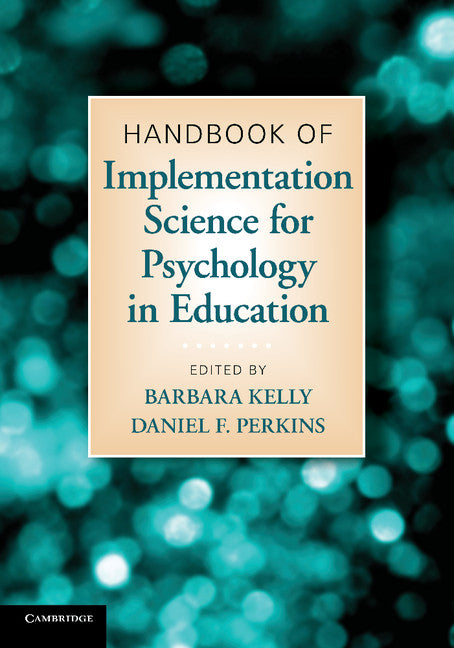Freshly Printed - allow 8 days lead
Couldn't load pickup availability
Handbook of Implementation Science for Psychology in Education
Aims to help policy makers, stakeholders, practitioners and teachers in psychology and education provide more effective interventions in educational contexts.
Barbara Kelly (Edited by), Daniel F. Perkins (Edited by)
9780521127028, Cambridge University Press
Paperback, published 27 March 2014
508 pages, 26 b/w illus. 32 tables
25.4 x 17.8 x 2.6 cm, 0.87 kg
Implementation science is the science of the effectiveness of research for real-world practitioners. This book is an indispensable, highly innovative and evidence-based resource aimed at utilizing research in psychology to improve all aspects of education, from individual teaching programs to organizational development. It addresses the widespread confusion and disappointment about the lack of effectiveness of real-world psychology and provides twenty-seven chapters offering proven policies, strategies and approaches for designing, supporting and improving interventions in schools. Collectively, the chapters go beyond the realm of psychology and education, tackling concerns about how to promote positive change in any context, covering topics from epistemology through statistics to examples of implementation approaches, frameworks and protocols. This book creates an immensely relevant body of information and evidence for any practitioner or organization facing the challenges of change. Essential reading for practitioners, policy makers, stakeholders and funders in psychology, education and beyond.
Foreword Robert Slavin
Part I. What is Implementation Science?: 1. Implementation science for psychology in education Barbara Kelly
2. Implementation science: key concepts, themes and evidence for practitioners in educational psychology Karen Blase, Melissa Van Dyke, Dean L. Fixsen and Frances Wallace Bailey
Part II. Statistical Problems, Approaches and Solutions in Real World Contexts: 3. Developing rigorous programme evaluation Tracey Bywater
4. Understanding the nature of experiments in real world educational contexts James Boyle
5. Meta analysis of implementation practice research Carl Dunst and Carol M. Trivette
6. Using evidence to inform practice in science teaching: the promise, the practice and the potential Judith Bennett
Part III. Preparing for Effective Implementation: Frameworks and Approaches: 7. Implementation science and enhancing delivery and practice in school psychology services: some lessons from the Scottish context Barbara Kelly
8. The role of executive frameworks in preparing for change in educational contexts Jey Monsen and Lisa Marks Woolfsen
9. Researching readiness for evidence-based practice: the evidence-based practice attitude scale (EBPAS) Gregory A. Aarons, Amy E. Green and Elizabeth Miller
10. Change focused organizational consultation in school settings Robert Illback
11. Implementation of interventions to promote school readiness Janet Welsh
Part IV. Successful Implementation of Specific Programmes and Interventions: Social, Emotional and Behavioural Change, Literacy Development and Leisure Education: 12. Maximizing effectiveness of social-emotional interventions for young children through high quality implementation Celene E. Domitrovich and Mark T. Greenberg
13. A framework for improving the impact of school-based social competence programmes Keith Topping
14. Positive behaviour support and young people with autism Glen Dunlap, Philip Strain and Lise Fox
15. Implementation of a family-centered, school-based intervention to prevent student academic and behavioural problems Elizabeth A. Stormshak, Kathryn Margolis, Cindy Huang and Thomas Dishion
16. Evidence-based reading interventions: implementation issues for the twenty-first century Robert Savage
17. Summary of research and implications for practice on reading interventions for young English language learners with reading difficulties Colleen Reutebuch and Sharon Vaughn
18. Implementing evidence-based leisure education programmes during school Linda Caldwell
Part V. Improving the Implementation of Evidence-Based Programmes and Interventions via Staff Skills, Organisational Approaches and Policy Development: 19. Key classroom features of promoting collaborative dialogue in the classroom Robyn M. Gillies
20. Practical applications of a 'fidelity of implementation' framework Mollie Rudnick, Cassie Freeman and Jeanne Century
21. Increasing student voice in school reforms: building partnerships, improving outcomes Dana Mitra
22. Coaching for instructional improvement and strategies that matter Barbara Neufield and Morgaen Donaldson
23. The use of evidence-based programs and quality childcare Ann Michelle Daniels
24. Action research: reshaping practice through assessment and critical reflection Violet Harader and Joyce Yukawa
25. Measuring child well being in schools: how robust outcome data may inform the selection, design and implementation of evidence-based programmes Tim Hobbs and Tamsin Ford
26. The common language service development model: from strategy development to implementation of evidence-based practice Nick Axford and Louise Morpeth
Part VI. Signposts towards Effectiveness: 27. Key themes in implementation science for psychology in education Barbara Kelly.
Subject Areas: Educational psychology [JNC], Occupational & industrial psychology [JMJ], Social, group or collective psychology [JMH], Social work [JKSN]


